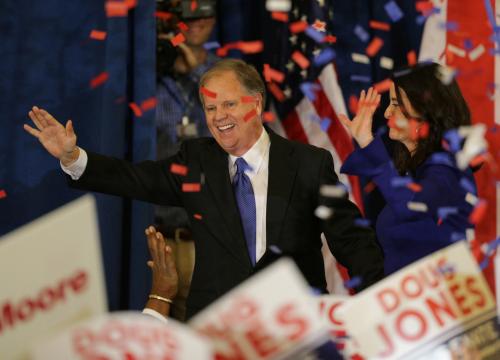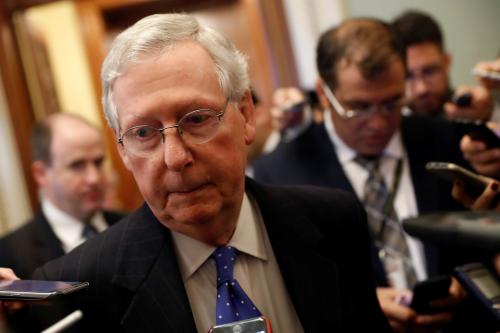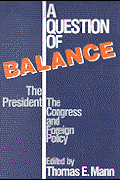Tonight’s contest for the Republican nomination for the US Senate seat in Alabama has significant political implications for national politics, with Roy Moore’s victory having consequences both inside and outside of the Republican Party. Off-year special elections for Senate seats don’t happen often, and their nominating contests are often straightforward affairs, especially when the seat is all but sure to remain in the hands of the party currently holding it.
However, the race between Luther Strange, the senator appointed by a scandal-plagued governor, and Roy Moore, a twice-removed state supreme court justice, became nationalized. The nationalization of the race has created some odd political alignments, but may also make for stormy politics over the next 13 months.
While both Strange and Moore are deeply conservative individuals, Strange’s brief time in the US Senate showed his party leadership that he was someone willing to work with fellow Senate Republicans. Senate Majority Leader Mitch McConnell (R-Ky.) and Senate Republicans’ allied super PAC, the Senate Leadership Fund, invested heavily in Strange’s campaign, hoping to retain a senator who has kept his head down, advanced conservative ideals, didn’t rock the boat, and provided a reliable vote for leadership.
Moore, on the other hand, campaigned vociferously as a Trump-style, unfiltered cultural conservative who embraced the ability to buck the party. His coarse language on issues like immigration and gay rights matched his obvious disdain for the institutional Republican Party and McConnell. It was clear from the campaign that Moore sought to be a thorn in McConnell’s side, rather than a trusted vote.
Despite Moore’s policy positions, rhetoric, and bases of support that look and sound significantly like the president’s, Trump opted to endorse and campaign for Strange. (Although the president’s pre-election rally for Strange did include soft support that Moore subsequently used in an attack ad.) Vice President Pence and other Beltway Republicans also campaigned for Strange.
Moore, on the other hand, garnered the support of some of the GOP’s more firebrand elements, including Sarah Palin, Steve Bannon, and Alex Jones. In many ways, Moore’s unconventional style (including brandishing a firearm at a recent campaign rally) matched the unconventional politics of some of these surrogates. Strange could be portrayed as the establishment-backed candidate, which could have hurt him. Moore could be portrayed as the anti-establishment candidate, which could have helped him. But, at the end of the day, both men also have long reputations in Alabama politics that likely also played a role.
So, what does this outcome mean moving forward?
Even though the candidate endorsed by Trump lost, the result shouldn’t be seen as a referendum on the president. In many ways, Moore’s rise to popularity in this race, style of campaigning, and base of voters who carried him to victory are torn from the pages of a mandatory textbook at the Donald Trump School of Politics. Moore may resent the president’s endorsement of Strange, but upon his arrival in Washington, the two will likely find themselves kindred spirits.
While Moore’s impressive showing may not be bad news for the president, it may well be for McConnell. McConnell has been quite effective in building and maintaining a Senate majority, but it currently stands at a narrow 52 seats. On most issues, we should expect Moore to vote with the Republicans, but his potential willingness to defy McConnell’s stated preferences may create problems for the majority leader.
The addition of Republicans like Moore to races across the country—or the empowerment of those who have already thrown their hats into the ring—could affect a variety of races. Primary challengers to sitting Republican senators may feel emboldened by Moore’s showing. We have already seen Arizona’s Jeff Flake and Nevada’s Dean Heller draw challengers to their right and who are currently beating them in polling. Will this phenomenon spread to other safe seats such as Mississippi’s Roger Wicker? As Brookings’s Primaries Project has shown, early filing deadlines will motivate challengers’ decisions soon and in a low turnout primary in a midterm election, more extreme candidates can thrive. In safe seats, a successful primary challenge from an extremist won’t lead to Democratic victory, but it could make it harder for McConnell to move bills through the upper chamber.
In other races with Democratic incumbents, Moore’s victory could spur additional challengers who are outside the mainstream. Rather than being scared off by a McConnell endorsement, challengers may be empowered by Moore’s performance. Right now, 10 Democratic Senators hail from states President Trump won in 2016, and Senate Republicans see 2018 as a much-needed opportunity to expand their majority. More extreme GOP candidates—like the ones on the ballots in places like Delaware, Indiana, Missouri, and Nevada in 2010 and 2012—could make it harder to seize on some of these opportunities. Given how difficult McConnell has found governing with 52 Republican senators to be, additional pickups in 2018 would be most welcome. Extreme nominees could limit those gains, and every Senate seat his party fails to pick up will make the job of governing all that more difficult—especially if 2018 ushers in GOP senators who relish bucking the party line.
This has been a tough week for Senate Republicans. Health care failed again. A Senate race in Alabama has shown the power of insurgency and the limits of the Senate Leadership Fund to overcome local political dynamics. And a reliable vote and team-player, Tennessee’s Bob Corker, announced his retirement. The Senate was supposed to be easy for Republicans in 2018; yet, each passing day seems to be making Mitch McConnell’s job all that much harder.











Commentary
Alabama nominates a thorn in Mitch McConnell’s side
September 26, 2017